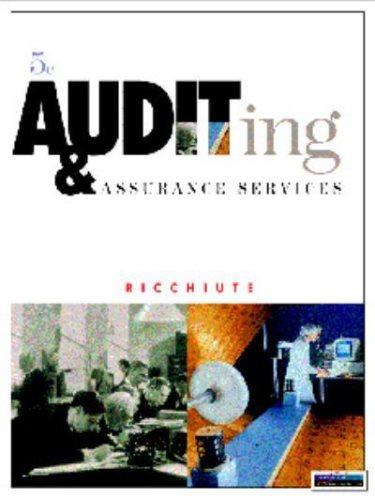Martinson, Brinks & Sutherland, LLP audited the financial statements of Masco Corporation, a medium-size wholesaler that leased
Question:
Martinson, Brinks & Sutherland, LLP audited the financial statements of Masco Corporation, a medium-size wholesaler that leased warehouse facilities. Masco sought bank financing for the leases, assuring the bank that the leasehold improvements would result in efficiencies and therefore a more profitable operation. On the basis of these assurances, the bank granted Masco a line of credit.
The loan agreement required annual audited financial statements. Masco submitted 1998 audited financial statements to the bank which disclosed net income of \($75,000,\) leasehold improvements of \($250,000,\) and net worth of \($350,000.\) Relying on the audited statements, the bank loaned Masco \($200,000.\) The audit report accompanying the financial statements disclaimed an opinion because the cost of the leasehold improvements could not be determined from the company's records. The part of the audit report dealing with leasehold improvements reads as follows:
Additions to fixed assets in 1998 were found to include principally warehouse improvements.
Practically all of this work was done by company employees and the cost of materials and overhead was paid by Masco. Unfortunately, fully completed, detailed cost records were not kept of these leasehold improvements, and no exact determination could he made as to the actual cost of said improvements. The total amount capitalized is set forth in Note 4.
In late 1999 Masco went out of business, and the claimed leasehold improvements were discovered to be totally fictitious. The labor expenses charged as leasehold improvements actually proved to be operating expenses, none of the materials costs had been recorded, and the auditors had not investigated whether the leasehold improvements existed. Had the \($250,000\) not been capitalized, the income statement would have reflected a substantial loss from operations and net worth would have decreased correspondingly.
The bank sustained a loss on the \($200,000\) loan to Masco and now seeks to recover damages from Martinson, Brinks & Sutherland, alleging the firm was negligent.
Required:
1. Will the disclaimer of opinion absolve Martinson, Brinks & Sutherland from responsibility for not detecting the fraud?
2. Are partners who did not take part in the audit liable?
Step by Step Answer:






